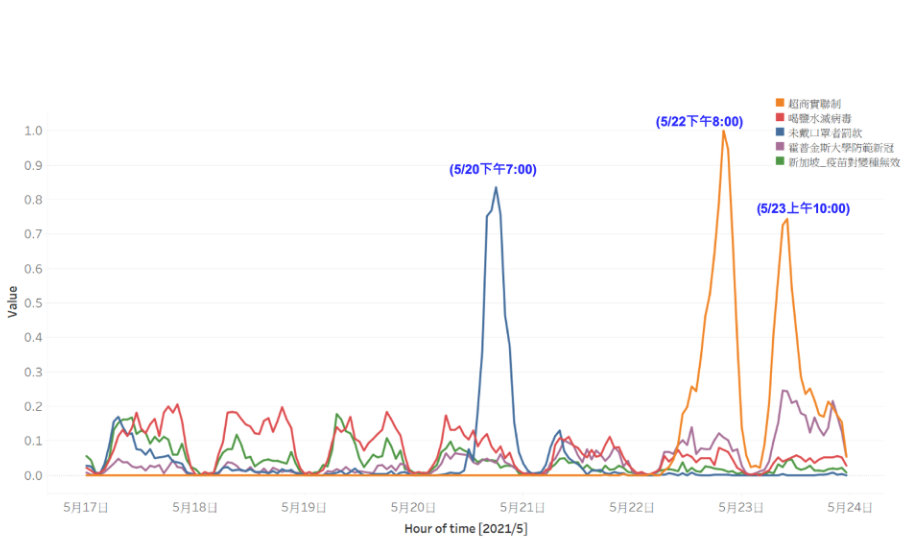The AI filter tool helps Taiwan FactCheck Center tackle Covid-19 hoaxes
Hui-An Ho
Artificial intelligence (AI) has played a crucial role in the battle with Covid-19 misinformation in Taiwan. The Rumor Catcher, a collaboration between the Taiwan FactCheck Center (TFC) and the Taiwan Institute for Information Industry (III), has enabled fact-checkers to detect and take timely action against Covid-19 disinformation and misinformation.
As a new wave of Covid-19 is hitting Taiwan, TFC has seen a lot of misinformation about the pandemic. Since mid-May, TFC has received five to six times more inquiries and claims from the audience than before this new wave which posed a real challenge.
TFC has been in this battle against Covid-19 hoaxes since the end of 2019, the very beginning of the outbreak. The difference between now and then is that the Rumor Catcher, the AI filter tool launched last Summer, is now TFC’s weapon to tackle massive misinformation.
Since the beginning of this year, TFC has detected over 20,000 pieces of online information, and has stopped the circulation of 300 rumors. This achievement could not have been done without the joint force of the AI tool, Rumor Catcher.
Since the end of 2020, the AI filter tool has collected readers’ claims from various resources one after another into the Rumor Catcher platform. Sources including TFC’s LINE chatbot and Facebook Messenger chatbot, the claim page on TFC’s site, and the Cofacts, the crowdsourcing, open-source fact-checking database, are put through to Rumor Catcher.
Presenting real-time data of how often one claim is reported, the platform acts as a screening tool for fact-checkers to identify the most viral and harmful claims.
“Rumor Catcher has improved fact-checkers’ workflow, which makes our fact-checking more timely, more comprehensive, and more thorough,” said Summer Chen, the Editor in Chief of Taiwan FactCheck Center.
The hidden figures behind the Rumor Catcher are technical experts from the Digital Service Innovation Institute and the Cybersecurity Technology Institute of III. Their work combining multiple AI technologies such as heterogeneous data comparison and clustering techniques enables fact-checkers to stop the spread of hoaxes in real-time.
The Rumor Catcher has helped TFC combat misinformation in four aspects:
1) Quickly respond to viral hoaxes
With the function “latest” on Rumor Catcher, fact-checkers can quickly flag the most viral information and observe how it spreads across multiple social media platforms. When a claim is going wildly viral and refers to public issues, fact-checkers at TFC can quickly take action to debunk it before it gains traction.
On May 15, a viral post circulating online claimed that chemical troops were deployed to sanitize with a toxic disinfectant in Taipei and New Taipei City. That piece of information had panicked the public: several readers called the TFC office to inquire about the veracity of the claim; in the meantime, Rumor Catcher showed the report numbers of that specific rumor skyrocketed – all this signaled fact-checkers to take immediate action. We published a fact-check rating the claim false that night.
2) Monitor misinformation phenomenons
The Rumor Catcher compiles complaints, groups similar claims, and builds up a misinformation database that allows fact-checkers to monitor and trace the life cycle of misinformation.
For example, when the Rumor Catcher receives a claim which is identical or similar to a debunked one, the AI tool will cluster the new and old ones in the same group and connect the new-emerged bit with the previous fact-check.
As recurring claims indicate a certain level of concern and virality among the public, fact-checkers can consider republishing the fact-check or produce infographics to extend the impact of the fact-checking. Furthermore, for claims of public interest, fact-checkers can take action to publish fact-checks and spread the bits of knowledge using other formats.
3) Understand misinformation trends
With the data supplied by the Rumor Catcher, TFC publishes “The Rumor Watch – Weekly Fact-Checks Top 10” to recap the most viral and significant claims in the past week. When the wave of Covid misinformation just hit Taiwan, TFC quickly announced the most viral falsehood for the past 24 hours to inoculate the public with misinformation vaccine, also thanks to the AI filter tool.
Owing to the more than 200 Covid-19 fact-checks accumulated since the outbreak, TFC can collect corresponding fact-checks replying to the current misinformation trends to alert the media and the public.
4) Database for research and optimization
Rumor Catcher’s database contains the trace of misinformation left in Taiwan, which is valuable for fact-checkers and researchers across the globe.
Since the launch of this AI filter tool, TFC and III have been studying the traits of misinformation, including its spread and its dynamic concerning TFC’s fact-checks, to better understand how to debunk falsehoods more efficiently to improve the workflow of fact-checkers.
Graph: III analyzed how the top 5 misinformations from May 17 to May 23 had been trending using the Rumor Catcher. (Source: Digital Service Innovation Institute of III)
You might find interesting:
<Taiwan’s fact-checkers are using AI to combat misinformation> published on 09.18.2020
<Cracking down Fake News from All Aspects by Technologies!> published on 09.18.2020
Taiwan FactCheck Center (TFC) is Taiwan's first independent nonprofit fact-checking organization, jointly founded by the Association for Quality Journalism and Taiwan Media Watch Foundation in 2018 to promote reliable information, digital literacy and improve the information ecology in Taiwan. A Verified signatory of the IFCN code of principles.






